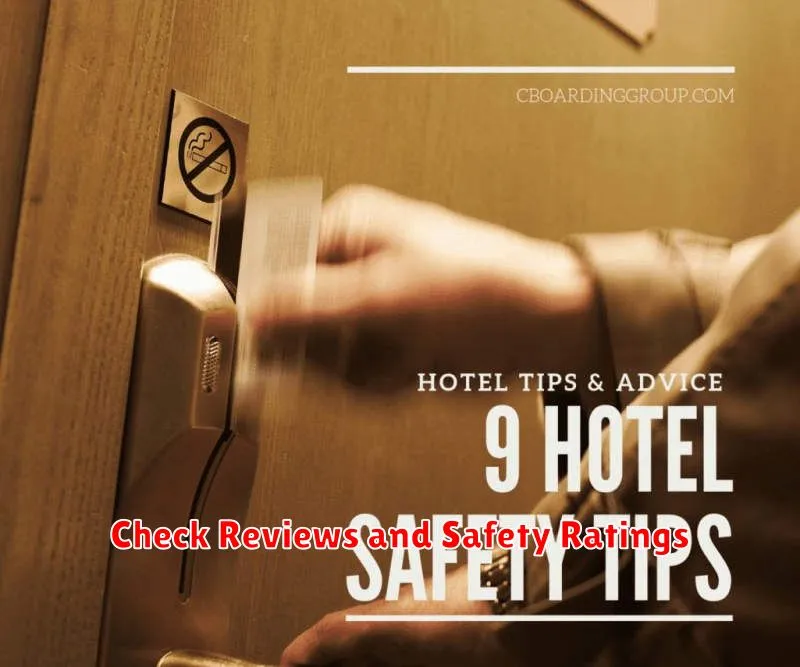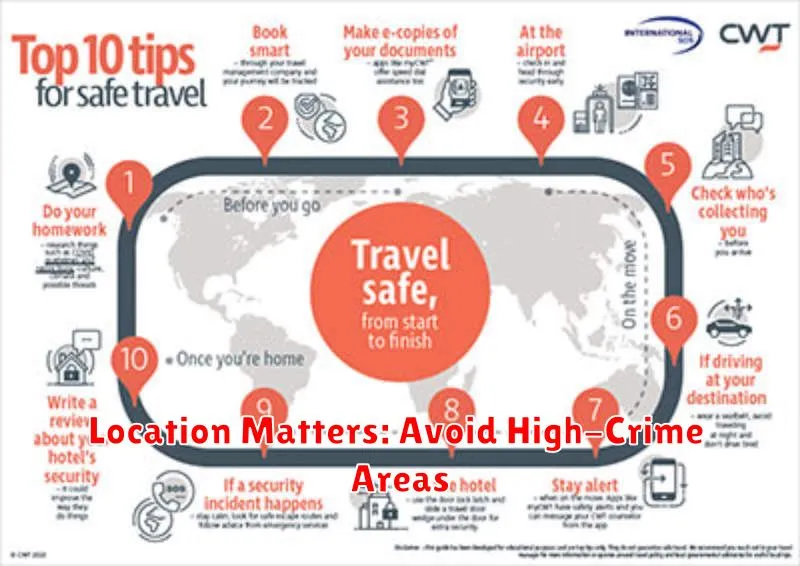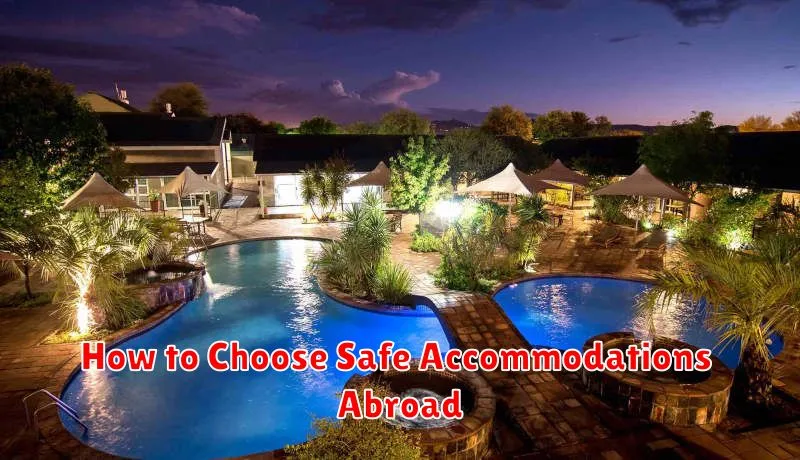Planning a trip abroad? Choosing safe accommodations is paramount to a successful and enjoyable experience. Whether you’re backpacking across Southeast Asia, exploring European cities, or venturing into South America, ensuring your safety and security should be your top priority. This comprehensive guide will provide valuable insights and practical tips on how to choose safe accommodations abroad, enabling you to focus on creating unforgettable memories rather than worrying about your well-being. Learn how to identify safe hostels, secure hotels, and reliable vacation rentals while traveling internationally. We’ll cover everything from researching neighborhoods and reading reviews to understanding local laws and customs.
From pre-trip research to on-the-ground assessments, we’ll equip you with the knowledge and resources necessary to make informed decisions about your lodging. Learn how to evaluate hotel security measures, identify red flags in vacation rentals, and choose safe hostels in unfamiliar cities. By following our advice, you can minimize risks and maximize your peace of mind while enjoying your international travels. We’ll delve into the essential steps for choosing safe accommodations abroad, including tips for solo travelers, families, and groups. Explore how to find safe accommodations for students abroad, secure locations for business travel, and reliable lodging options for long-term stays.
Importance of Safe Lodging While Traveling
Safe lodging is paramount to a positive travel experience. It serves as a sanctuary and base of operations, offering a place to rest, recharge, and store belongings securely. Choosing safe accommodations significantly reduces the risk of theft, assault, and other safety concerns, allowing you to enjoy your trip with greater peace of mind.
A secure environment contributes significantly to overall well-being while traveling. Knowing your accommodations are safe can alleviate stress and anxiety, allowing you to focus on exploring and experiencing your destination. This is especially crucial when traveling to unfamiliar locations or traveling solo.
Furthermore, safe lodging often comes with added benefits such as reliable staff, secure entry systems, and well-lit surroundings. These features enhance personal safety and provide an added layer of protection against unforeseen circumstances. A safe and reputable establishment can also offer valuable local insights and assistance, contributing to a smoother and more enjoyable travel experience.
Use Trusted Booking Platforms
When booking accommodations abroad, prioritize well-established and reputable booking platforms. These platforms often have verification processes in place for listed properties, ensuring a higher level of safety and legitimacy. They also typically offer secure payment gateways, protecting your financial information. Furthermore, using a trusted platform provides access to verified reviews and ratings from previous guests, giving you valuable insights into the accommodation’s safety, cleanliness, and overall quality.
Look for platforms with clear cancellation policies and customer support options. This is crucial in case unforeseen circumstances arise, requiring you to alter your travel plans or address issues with your booking. A reliable platform will have mechanisms in place to assist you and ensure a smooth resolution process.
While researching platforms, consider those offering additional safety features. Some platforms provide 24/7 support, emergency contact information, and even travel insurance options. These added layers of security can contribute significantly to a safer and more worry-free travel experience.
Check Reviews and Safety Ratings

Prior to booking any accommodation, thoroughly examine reviews and safety ratings from reputable sources. Websites and apps specializing in travel often provide valuable insights from previous guests. Pay close attention to comments regarding security measures, neighborhood safety, and staff responsiveness.
Look for establishments with verified safety certifications or those adhering to recognized safety standards. These certifications can indicate that the accommodation meets specific requirements regarding fire safety, security protocols, and hygiene practices.
Focus on reviews that mention specific safety aspects, such as the presence of working smoke detectors, secure locks, well-lit common areas, and 24-hour reception. Don’t solely rely on overall ratings, but delve into the details to gain a comprehensive understanding of the accommodation’s safety profile.
Consider using filters to narrow your search based on safety-related keywords, like “secure,” “safe neighborhood,” or “family-friendly.” This can help you quickly identify accommodations that prioritize guest safety.
Location Matters: Avoid High-Crime Areas

When selecting accommodations abroad, prioritizing safety is paramount. A key aspect of this is researching the neighborhood’s crime rate. Avoid areas known for high crime, even if they offer seemingly attractive deals. Your safety and peace of mind are worth more than a bargain.
Utilize online resources to research crime statistics and local safety reports. Consult travel forums and blogs for firsthand accounts from other travelers. Reach out to your accommodation provider directly to inquire about the safety of the surrounding area. Be proactive in your research to make informed decisions.
Consider the time of day you will be arriving and departing. Avoid walking alone in unfamiliar or poorly lit areas, especially at night. Opt for accommodations in well-lit and populated areas, close to public transportation and reputable establishments.
While staying in well-known tourist areas can offer a sense of security, they can also be targets for petty theft. Remain vigilant and aware of your surroundings, regardless of your location. Secure your valuables and avoid displaying expensive jewelry or electronics.
Room Security Features to Look For
When selecting accommodations, prioritize your safety by examining key room features. A solid core door with a deadbolt lock and a viewfinder or peephole are essential. Chain locks or security bars provide an additional layer of protection. Ensure windows have functioning locks and are made of reinforced glass if possible.
Consider the room’s location within the building. Opt for rooms on upper floors and avoid those easily accessible from the outside. Inquire about in-room safes for storing valuable items like passports and electronics. Check if the accommodation provides 24-hour reception or security personnel and well-lit corridors and common areas.
Smoke detectors and a readily available fire extinguisher are vital safety features that should not be overlooked. Familiarize yourself with the building’s fire escape routes upon arrival.
Avoid Sharing Too Much Info Online
While excitement about your trip is natural, resist oversharing on social media. Publicly posting details like your accommodation address, travel dates, or even the fact that you’re away from home can make you a target for opportunistic criminals. Privacy is key to staying safe.
Limit your posts to general locations and avoid real-time updates. Consider delaying your photo uploads until after you’ve returned home. If you absolutely must share in real time, ensure your social media accounts are set to private and only visible to trusted contacts. Be mindful of the information visible in the background of photos, such as street signs or identifying landmarks.
Refrain from tagging your precise location or checking into specific accommodations. These actions advertise your whereabouts to a potentially wide audience, increasing your vulnerability. Be cautious even when using seemingly harmless features like location-based filters, which can inadvertently disclose more than intended.
Have a Backup Plan in Case of Issues
Even with meticulous planning, unforeseen circumstances can disrupt your accommodation plans. Having a backup plan is crucial for a stress-free trip. Consider pre-booking a second accommodation option for the first night, especially if arriving late at night. This provides a safety net if your primary booking falls through.
Alternatively, identify nearby hotels in a similar price range. Note their contact information and address for easy access if needed. Always have a plan B for contacting friends or family back home in case of communication difficulties. Share your itinerary with them, including accommodation details and emergency contact information.
Consider potential issues such as flight delays, cancellations, or accommodation closures. Research alternative transportation and lodging options in advance. Understanding local transportation, communication infrastructure, and emergency services is also a key aspect of a comprehensive backup plan.

